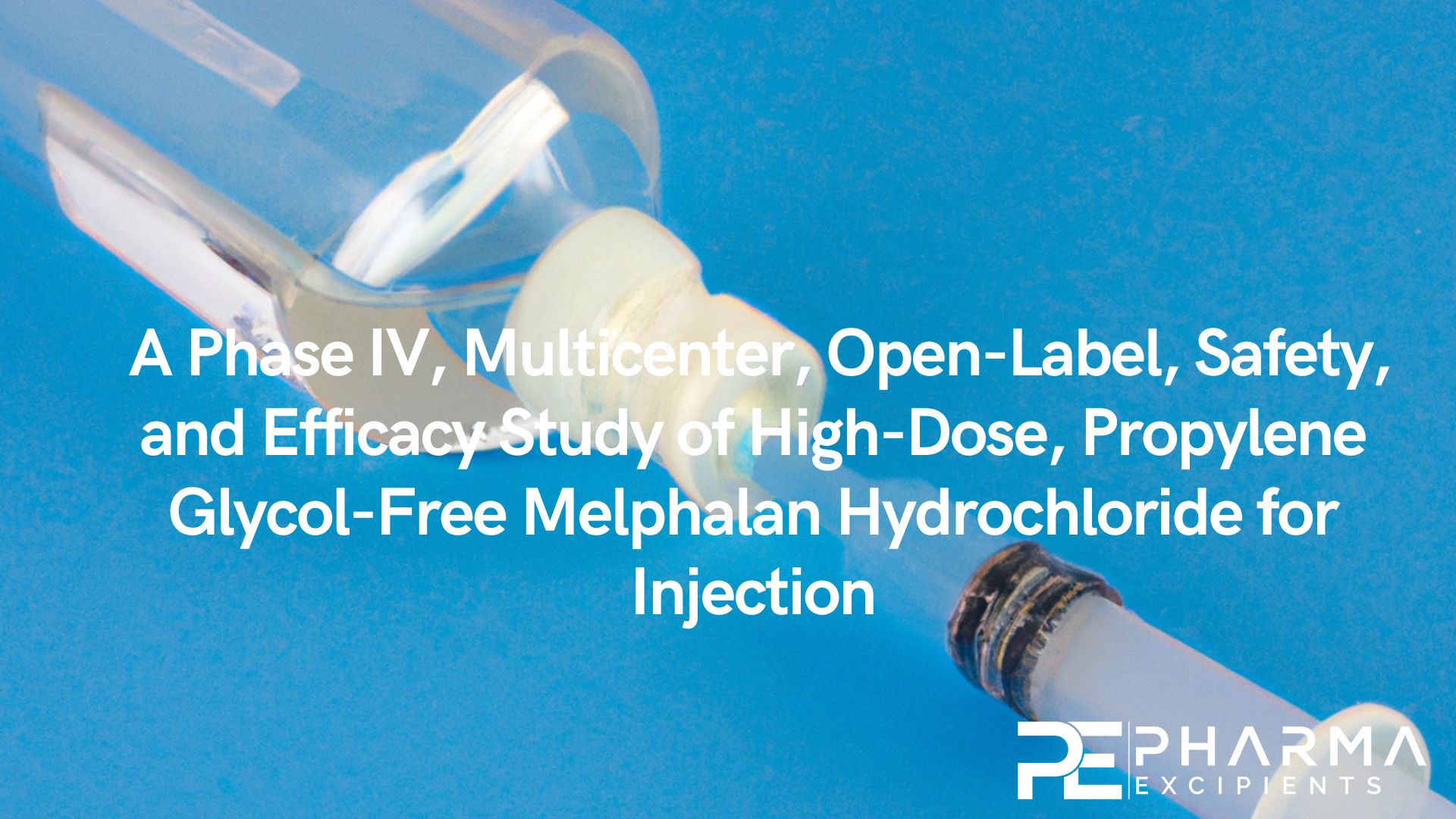A Phase IV, Multicenter, Open-Label, Safety, and Efficacy Study of High-Dose, Propylene Glycol-Free Melphalan Hydrochloride for Injection (EVOMELA) As a Myeloablative Conditioning Regimen in Chinese Multiple Myeloma Patients Undergoing Autologous Stem Cell Transplantation

Introduction:
ASCT is a standard of care in transplant-eligible MM patients which has been demonstrated with a better complete remission rate (CR) and with longer survival. High-dose melphalan (200 mg/m2) has been the most commonly used conditioning regimen for ASCT in MM. EVOMELA (propylene glycol-free melphalan HCl) stabilized with Captisol, a specially modified cyclodextrin, has been believed to have better solubility and stability upon reconstitution than propylene glycol-based melphalan (eg, Alkeran for Injection [melphalan hydrochloride]) which result in decreased toxicity, increased convenience and flexibility of administration without comprising efficacious data. EVOMELA has been approved in China as a standard conditioning drug for ASCT in MM patients. The current study evaluated the efficacy, safety, and PK profile for high-dose EVOMELA as a myeloablative conditioning regimen in Chinese symptomatic transplant-eligible MM patients.
Methods:
The prospective, multicenter, open-label, phase IV study was conducted at 10 centers in China from July 2020 to March 2021. The total amount of EVOMELA (200 mg/m2) was i.v. administered in two doses as 100 mg/m2/day on days -3 and -2 before ASCT (day 0) of no less than 2×106 CD34+ cells/kg. Myeloablation and engraftment were assessed after transplantation. Treatment response was assessed on day 95±5 according to IMWG criteria. Safety was assessed according to NCI CTCAE version 5.0 as assessed by the investigators. TEAE was defined as AE that occurred or worsened on or after the first study treatment up through 30 days after the last study treatment. Mucositis was also assessed using the WHO oral toxicity scale. The PK profile was investigated with blood samples drawn before infusion and at 10, 20, 30, 60, 90, 120, 180, 240, and 360 minutes after the completion of the infusion of EVOMELA.
Results:
A total of 67 MM patients, 36 (53.7%) male and 31 (46.3%) female, with a median age of 54 (range, from 34 to 65) were enrolled. All patients have received the full dose and achieved myeloablation with a median time of 5 days. The median time to myeloablation based on ANC criteria (< 0.5×109/L) was 9 days. In addition, neutrophil and platelet engraftments were achieved in all (100%) patients with a median time of 11 days and 12 days post-ASCT respectively. Sixty-five evaluable patients (2 patients discontinued due to protocol deviation or loss of follow-up) were assessed for clinical responses at day 95±5 per the IMWG criteria. The ORR was 92.3% with 27.7% of sCR, 32.3% of CR, 27.7% of VGPR, and 27.7% of PR. One (1.5%) patient had stable disease and 4 (6.2%) patients experienced disease progression. (Table 1 and Table 2)
All patients had at least 1 drug-related TEAE in this study. The treatment-related mortality was 0% and no TEAE led to the discontinuation of the study. The incidence of Grade 3 and Grade 4-related TEAEs was 41.8%. The most frequent nonhematologic related TEAEs reported in ≥25% of patients were diarrhea (88.1%), nausea (86.6%), vomiting (62.7%), decreased appetite (52.2%), pyrexia (46.3%), hypokalemia (43.3%), hypocalcemia (41.8%), fatigue (38.8%), stomatitis (37.3%), blood lactate dehydrogenase increased (31.3%). Three (4.5%) patients experienced grades 3 related SAEs, and all SAEs were resolved during the study. Five (7.5%) patients reported grade 3 as the worst post-treatment mucositis throughout the study. No case of Grade 4 mucositis nor use of opioids for mucositis pain was reported during the study. PK data indicated that with a median infusion time was 136.5 minutes, Cmax and AUC0-∞ on day-3, day-2 were 2810.83 and 3464.17 ng/mL, 5489.22 and 6351.82 h*ng/mL respectively. The mean elimination half-life (t1/2) was 1.1 hours.
Conclusions:
To our knowledge, this is the largest prospective study to date to demonstrate the safety and efficacy of EVOMELA as a high-dose conditioning regimen for ASCT in Chinese MM patients. EVOMELA was shown to be safe and well-tolerated that most of the AEs were transient or manageable with no unexpected toxicities. High-dose therapy induced myeloablation in all patients and allowed for successful timely engraftments of both neutrophils and platelets. Most patients achieved great response rates.
Read more
Fengrong Wang,Zhen Cai,Dehui Zou,Wenming Chen,Yongping Song,Chengcheng Fu,Jiong Hu,Ting Yang,Xinchuan Chen,Jinsong Yan,Kaiyan Liu; A Phase IV, Multicenter, Open-Label, Safety, and Efficacy Study of High-Dose, Propylene Glycol-Free Melphalan Hydrochloride for Injection (EVOMELA) As a Myeloablative Conditioning Regimen in Chinese Multiple Myeloma Patients Undergoing Autologous Stem Cell Transplantation; Blood (2022) 140 (Supplement 1): 4845–4847; https://doi.org/10.1182/blood-2022-163171

